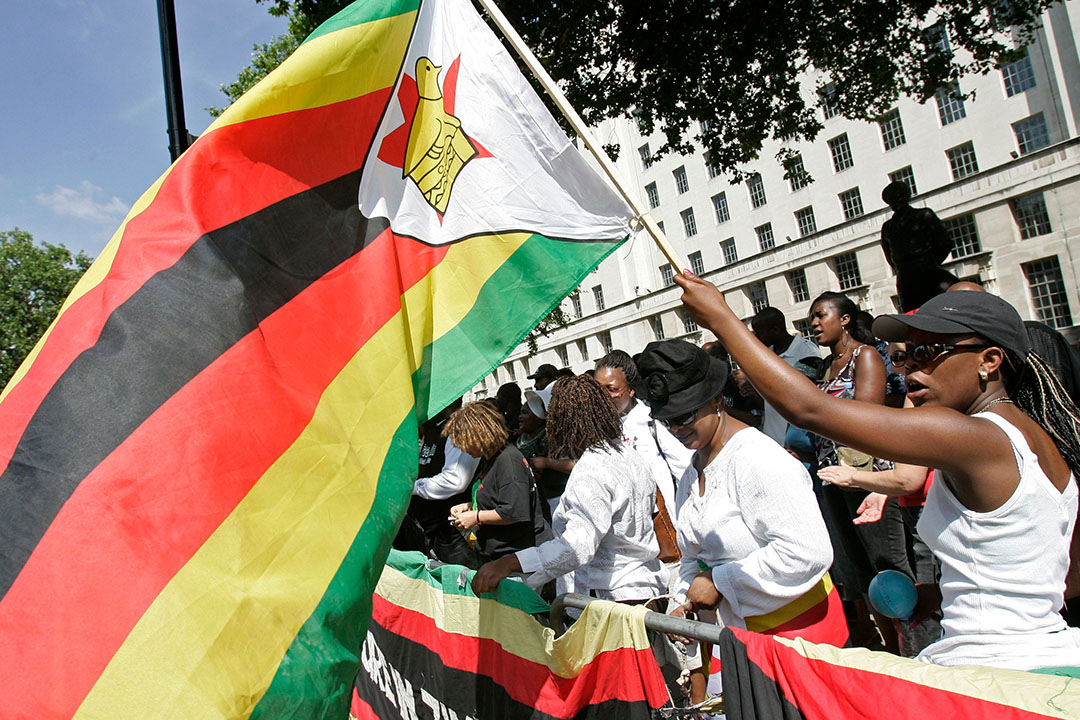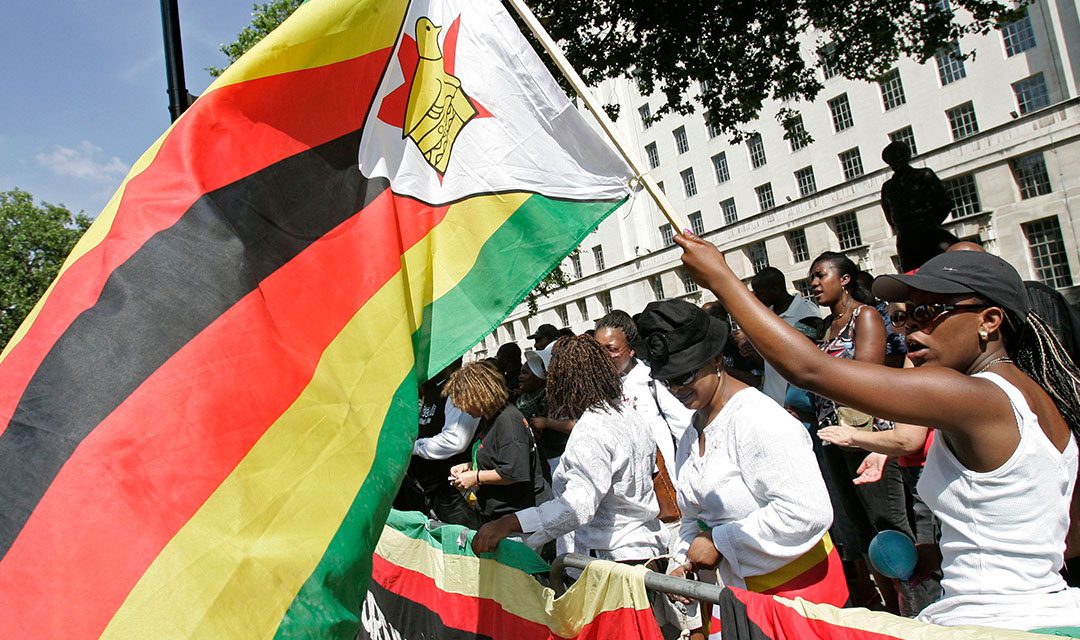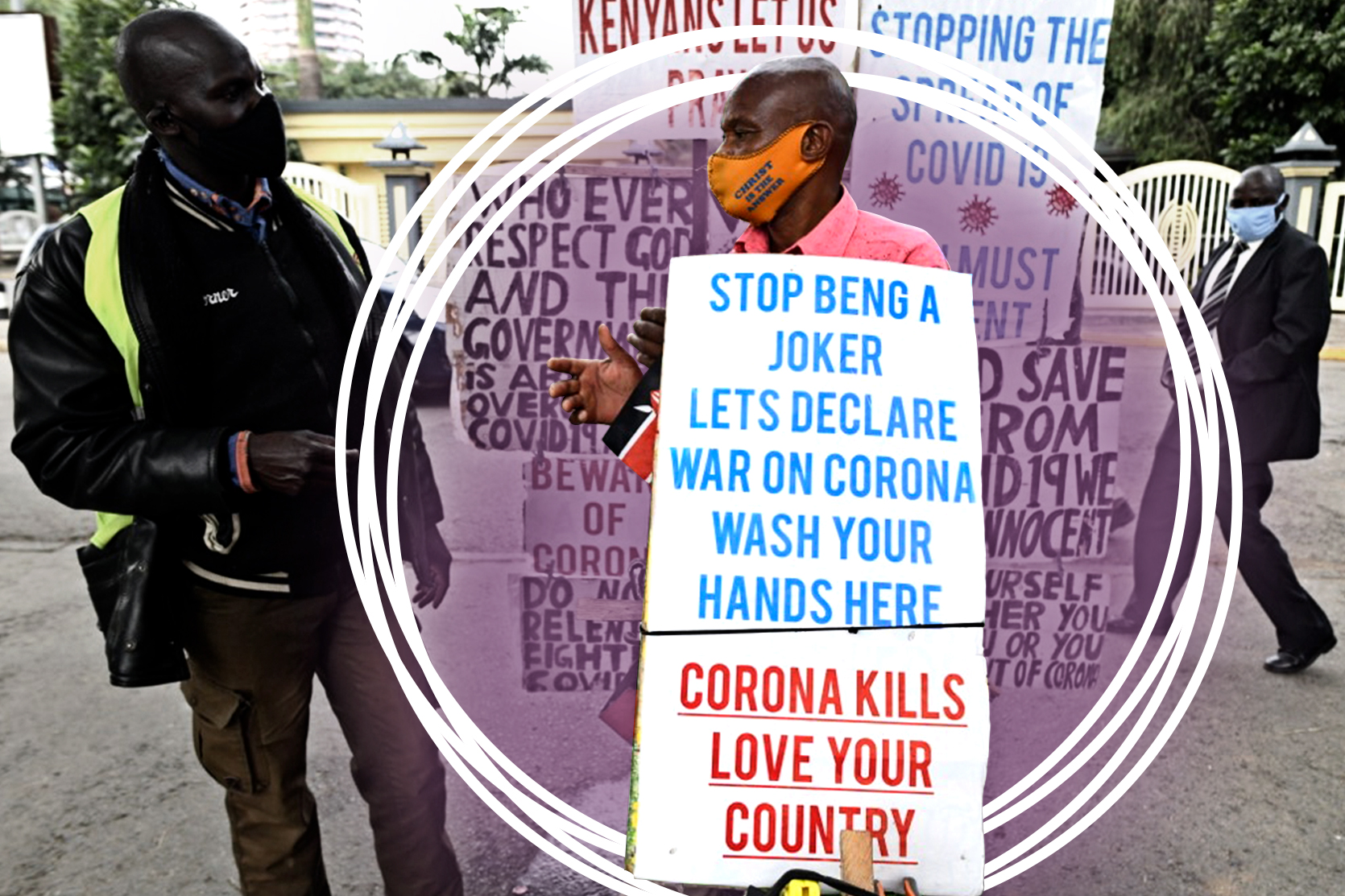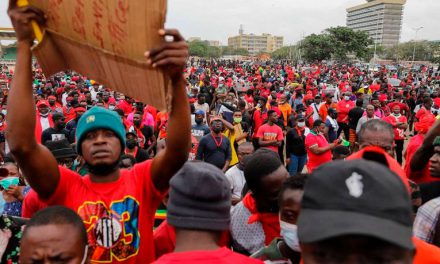The ruling ZANU-PF is unlikely to use its majority in parliament to push for a diaspora vote anytime soon

A small group of Zimbabweans protest outside Downing Street 28 July 2006 over the continuing situation in their country. AFP PHOTO/SHAUN CURRY (Photo by SHAUN CURRY / AFP)
According to the United Nations, at least one in three – an estimated 258 million – people are living in a country other than their country of birth. The majority of these people have moved from developing countries to the developed world, but they remain engaged and interested in the politics and economic situation of home. According to a recent World Bank report, remittances have grown from about $2 billion in 1970 to an estimated $554 billion globally (Ratha, Eigen-Zucchi, & Plaza, 2016). To date, net global remittances are almost three times the amount of aid sent to developing countries and continue to play an important role in supporting families back home. Sub-Saharan countries, including Zimbabwe, received a total of $38 billion in 2017. However, most migrants are excluded from home politics and in the majority of countries they are denied the right to vote.
In Africa, the expansion of diaspora rights has been slow with just a handful of countries, including Rwanda, Ghana, Botswana, South Africa and Kenya, allowing a select population of those living abroad the right to vote. Zimbabwe is one of the few remaining countries that deny the majority of their diaspora the right to vote.
Ahead of the 2018 election a record number of Zimbabweans in the diaspora travelled home to vote. However, many more were unable to participate because the cost of travelling back home, in real dollars and time, was high, even for those in nearby South Africa. In 2017 by comparison, the Kenyan government extended the vote to citizens living abroad in Burundi, Tanzania, Rwanda and Uganda, where the turnout for the first round of diaspora voting was low. Diaspora voting among the Batswana has also been low. But it is unlikely that the Zimbabwe diaspora vote would follow the same path.
The Zimbabwean diaspora has lobbied for the right to vote since the early 2000s, but the government has thus far refused to extend this right to citizens abroad. Zimbabwe does not allow for external voting, with the exception of citizens who hold diplomatic posts abroad. The Constitution in 1980 was ratified to allow Zimbabweans living abroad while in service to the government to vote. The Electoral Act was amended in 2015, limiting voting rights for those abroad and there is no mention of voting at a diplomatic mission: “Eligibility to vote by post is limited to persons ordinarily resident in Zimbabwe who are resident in the constituency (electoral district) in which the election is to take place or were resident in that constituency 12 months preceding polling day and have good reason to believe that they will be absent from the constituency or unable to attend at the polling station by reason of being ‘absent from Zimbabwe in the service of the government of Zimbabwe’ (section 71(1)(b)).”
The electoral authorities have taken great care to ensure that the external voting process for the minority who are granted the right to vote is transparent through the provisions discussed above. In the past decade, Zimbabweans in the diaspora, especially those in the United Kingdom (UK), have been very vocal in their demand for the right to vote. In 2005, a coalition of Zimbabweans resident in the UK lodged a case against the government with the Zimbabwe Supreme Court (Case no. SC 22/05). The Supreme Court dismissed the case, arguing that it did not hold any merit, despite the fact that the Constitution provides suffrage for all Zimbabweans regardless of race, creed or place of residency at the time of an election (Tungwarara, 2005).
Zimbabweans in the diaspora have accused the government of discriminating against some of its citizens for allowing only a small minority holding diplomatic posts the privilege of voting. In response to the court case, the Zimbabwean government, represented by the minister of justice and legal affairs, denied that Zimbabweans living abroad were being discriminated against by the absence of external voting provisions in the Constitution. The minister, who was cited as the first respondent, also argued that the electoral law disqualified voters from the voting process who had been absent from Zimbabwe for 12 months or more prior to the election. When Zimbabweans in the diaspora pointed to the voting rights as documented in the Southern African Development Committee’s (SADC) Declaration of Human Rights Charter, the government argued that the SADC charter is a “guide that SADC countries must follow towards a future democratic idea, (but that) it is not a legal document that is binding on member states”(Tungwarara, 2005).
In 2012, the diaspora vote issue once again came to the forefront of Zimbabwean politics during the constitution-making deliberations. The Constitution Committee (COPAC) sought out a diversity of opinions and feedback on the Constitution, including the opinions of Zimbabweans living abroad. The Zimbabwean diaspora asked for three provisions to be included in the Constitution; dual citizenship, devolution of power, and a diaspora vote.
Dual citizenship is important for Zimbabweans who have established residency abroad but also wish to maintain ties with their homeland. Zimbabweans living abroad argue that they should not be asked to choose between places where they have built homes for their families and their country of birth. Dual citizenship and a provision for diaspora voting would allow Zimbabweans to participate freely in their host countries as well as in the affairs of their homeland. Most Zimbabweans who migrated continue to maintain strong ties with family members who remained in Zimbabwe.
The Constitution is silent regarding the diaspora vote, and the weakened opposition has not offered much support in recent years. Publicly, the opposition has made demands for the vote but privately the MDC has been reserved. Back in September 2012, the MDC’s former national secretary, Abednigo Bhebhe, argued that his party was now tabling the issue of the diaspora vote because they feared rigging of postal votes by ZANU-PF, especially within Africa. Bhebhe said that while the MDC agrees “in principle” that citizens in the diaspora should be allowed to vote, the governments in the SADC region would rig election outcomes in support for ZANU-PF because of liberation struggle ties (Bulawayo24 NEWS – MDC-T, ZANU-PF Agree to Disallow Diaspora Postal Votes n.d.).
ZANU-PF’s position on the diaspora was always a firm “no”. As ZANU-PF Minister of Justice (2013), Emmerson Mnangangwa spoke on behalf of his party on the diaspora vote issue, arguing that the MDC wanted those in the diaspora to be able to vote because they were the only ones who could address voters in Europe. The party has consistently argued that the sanctions placed on their top leaders barring them from visiting most western countries, including the UK, home to the largest Zimbabwean diaspora population, made a diaspora vote hostile for the ruling party. Mnangangwa repeated the party line that, “Sanctions must go first and if they don’t, those in the diaspora would not be able to vote until they returned home”.
Another ZANU-PF spokesperson and then Minister of Justice Patrick Chinamasa in 2004 gave what he called “101 reasons why those in exile can not vote”, one of which was the argument that the country was not financially equipped to take on such an undertaking. He argued that, given the financial and logistical costs involved, running a successful external vote was beyond the capacity of the Zimbabwean government and logistical costs. Like Mnangangwa, Chinamasa argued that the sanctions undermined the democratic process. Referring to the impact of travel bans on the ZANU-PF elites he said: “Those individuals (referring to sanctioned elites) are senior people in a political party and one of the fundamental elements of democracy is that the voters must be accessible to all those candidates who want to seek office. They must be accessible to all, not only to a few. It must not be a hostage population, only free and accessible only to one of us (Marambanaye, n.d.).”
However, since the ouster of Robert Mugabe in late 2017, the new government led by Mnangagwa has made public statements promising a revisiting of the law. In August 2018, Foreign Minister Sibusiso Moyo went on a mission to sell the government to the world as new and changed. However, it is unlikely that ZANU-PF will use their majority in parliament to push for a diaspora vote anytime soon.
CHIPO DENDERE is a Zimbabwean born scholar of political science. As a Consortium for Diversity – post-doctoral fellow at Amherst College, she teaches political sciences classes on African politics and democratisation in the developing world. She completed her BSc degrees in political science and psychology at Linfield College, Oregon and her PhD in political science at Georgia State University in 2015









A very good article indeed . Would it be possible if I could have a copy of the article. In addition would it be possible if I could publish it in our new organisation, MyRight2Vote. It is a Human Rights organisation trying to obtain the Vote for the Zimbabwean diaspora.
Many Thanks
Chief N Ndiweni Ntabazinduna
Hi Chief,
Apologies for the delay and thank you for getting in touch. Kindly contact our Africa In Fact editor Susan Thomas for further assistance. Her email address is susan@gga.org.